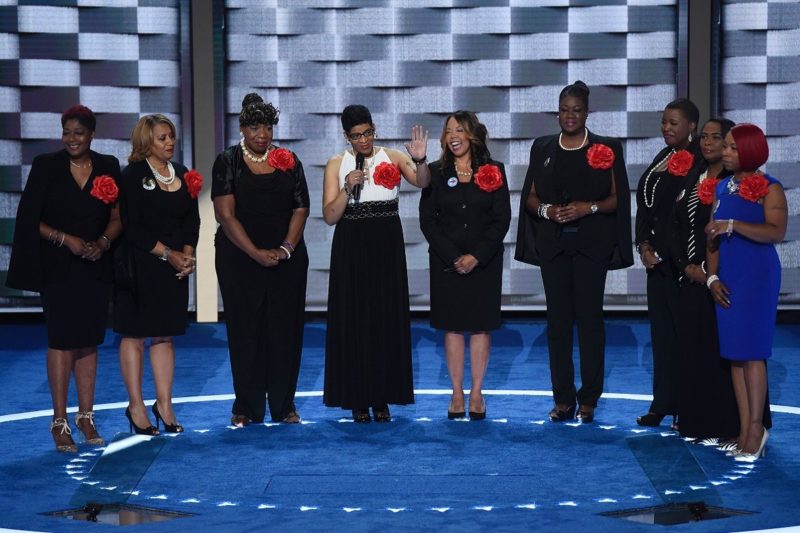The Loss of Our Sons and Daughters Is More Than a Political Moment
We must bear witness to support the Black mothers who shared their stories of losing children to state and racial violence at the Democratic National Convention. But bearing witness means demanding justice and policy change.

When I watched the Mothers of the Movement—a group of Black mothers of slain children—take center stage at the Democratic National Convention (DNC) last week, I saw Black women “making a way out of no way.” We turn our suffering and righteous indignation into agency.
Sybrina Fulton, Trayvon Martin’s mother, talked about being thrust into the spotlight while grappling with her teenage son’s killing. Geneva Reed-Veal, the mother of Sandra Bland, began her remarks by acknowledging God’s greatness and how the mothers’ presence at the DNC was itself proof of that greatness. She then related the horrific details of her 28-year-old daughter being found hanging in a Texas jail cell after a possibly unlawful traffic stop in 2015. She called it the worst nightmare anyone could imagine.
But as eloquent and moving as the Mothers of the Movement were, their narratives were treated as a political moment that demonstrated mostly that Hillary Clinton had successfully campaigned to garner the backing of these mothers who are surviving reproductive loss. As I watched Reed-Veal fight back tears, I wondered what type of strength it takes to find peace with such a loss.
The lives of women such as Fulton and Reed-Veal—and those of their deceased children and their remaining families—matter more than a fleeting appearance in Philadelphia. While Clinton is apparently able to imagine what it means to lose a child and talk about that on the campaign trail, it is different to live with the immeasurable weight of losing a loved one, especially when it was due to systemic racism.
In the Christian tradition, we remember Jesus’ suffering on the cross. And the mothers’ words call us to bear witness to police violence and the women who suffer irreparable reproductive loss. But bearing witness requires us to do more than see and hear about atrocities. We must also demand justice.
Reproductive justice theory holds that women have the human rights to bear children (or not), and to parent with the necessary social and economic supports so that their children not only survive, but thrive. Thriving means access to safe affordable housing, quality education, a living wage, healthy foods, and health care that is grounded in prevention and healing. It means living without fear of violence, especially from the very state authorities entrusted with protecting us.
In Sisters in the Wilderness: The Challenge of Womanist God-Talk, womanist theologian Delores Williams discusses Black women and a particular type of “surrogacy.” She uses the biblical story of Egyptian slave Hagar, who became Abraham’s concubine to bear him the son that his wife, Sarah, had not. Hagar’s body—and her child—were not her own. Williams argues that Black women have long been forced to step into others’ roles—raising white women’s children during and after slavery, for one—and that surrogacy has been exploitative.
We stand now in a moment where Black women are still surrogates. Their children are not their own, used as human targets by law enforcement and racists to act out their hatred of Black people. And even as the Mothers of the Movement struggle to grieve, their pain plays out in public.
To honor and address their pain, we must listen compassionately to Black people who say “Black Lives Matter.” The shootings of police officers cannot be used to scapegoat the legitimate concerns and demands of Black Lives Matter, which push us to confront historical and ongoing violence against Black Americans. Those urgent cries must fall on ears ready to understand the long history of our lives not mattering in this country. Those cries come from the collective memory of enslaved Black bodies, especially Black mothers forced to bear children to gratify economic greed, and firsthand contemporary experience.
Political candidates must also do more than just listen to the heartrending stories. They must also put forth concrete legislation to address the structural inequality behind racial profiling and the murders of Black people.
While Clinton’s platform includes ending gun violence and building trust between communities and police, what we did not hear at the DNC was how she would advance policies that would prevent the tragic reproductive loss that the Mothers of the Movement now know.
Her platform sounds progressive, but I cannot help but remember her racially coded comments in support of the 1994 Violent Crime Control Act: that youth in gangs “are often the kinds of kids that are called ‘super-predators.’ No conscience, no empathy. We can talk about why they ended up that way, but first we have to bring them to heel.”
Typically, dogs are brought to heel so that they walk close to or follow their owners. An unconscious, unfortunate choice of wording, perhaps? Still, the anti-poor legislation passed during her husband’s administration, and which she supported, has created and worsened conditions that shove poor families, disproportionately families of color, further into poverty.
In this watershed moment, radical accountability is needed if we’re to stem the use of deadly force against Black people.
Our elected leaders can model accountability by admitting that their own policies or statements have fed the police and not hungry people. Quite frankly, Clinton’s support of the crime bill and of the federal welfare reform requires some meaningful and public repentance.
And that repentance has to be more than a moment at the DNC or any future political gathering, but a sincere strategy to correct the injustices that claimed the Mothers of the Movement’s children. This is what it means to bear witness.
